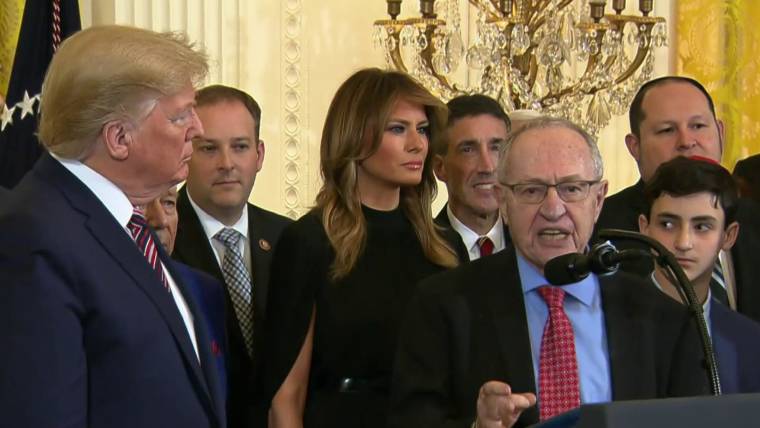WASHINGTON — In furtive conversations with senior colleagues on the House floor, with their own aides and in private conclaves like Wednesday’s weekly Congressional Black Caucus luncheon, Democratic lawmakers have been quietly trying to game out how to become one of the “managers” who will prosecute the case in the Senate if the House impeaches President Donald Trump.
“There are a lot of discussions going on and rumors,” Rep. Val Demings, D-Fla., a member of the House Judiciary Committee and the CBC, said after the panel’s impeachment meeting Wednesday night. “I’m told that my name is on the list [for consideration], but I have not actively sought to be one of the floor managers. … If the speaker would like for me to do that, I would be happy to do it.”
The allure of being named to a select group for a historic mission — no matter the cautionary tale provided by the last Senate trial of a president — is as self-evident as most lawmakers’ desire to carve out a personal legacy, get more airtime on television and raise more campaign money.
At the same time, it’s a complicated task for the politically ambitious because the picks will be made solely at the discretion of Speaker Nancy Pelosi, D-Calif., and many House members presume that it could be disqualifying to lobby too hard — especially publicly — for posts that require the utmost solemnity.
“I don’t even want to comment on it, if that’s all right,” Rep. Jamie Raskin, D-Md., a former editor of the Harvard Law Review, said when asked if he had heard of any jockeying or was interested in being considered himself.
“I’m happy to talk about the substance of anything that’s going on,” Raskin, who is on the Judiciary Committee, added. “We’re very focused on what’s happening in Judiciary right now.”
Let our news meet your inbox. The news and stories that matters, delivered weekday mornings.
After months of hearing House Democrats brag that they can walk and chew gum at the same time — meaning they haven’t abandoned their legislative work to impeach Trump — it might be surprising to find that they had suddenly lost their ability to multitask at just the moment one of the pressing matters involves their own interests.
But a senior Democratic aide who spoke to NBC News on the condition of anonymity because he wasn’t authorized to speak on the record said that behind the scenes, lawmakers are using all the familiar means to try to influence Pelosi, from drafting letters to her to lining up support from colleagues.
“Everyone is doing everything,” the aide said.
At the CBC meeting, talks centered on trying to ensure that the set of managers includes African American representation, according to several attendees. Black lawmakers reviewed the history of President Bill Clinton’s impeachment, when Republicans named 13 managers — all white male members of the Judiciary Committee — to take their case to the Senate.
“There was discussion about if we keep the same number, it certainly should be a diverse group of people,” Demings said.
Demings, a former Orlando police chief, is one of eight CBC members on the Judiciary Committee, which also has several Latino and Asian American lawmakers. Of the handful of Democrats in the House with experience as prosecutors, only two are black women: Del. Stacey Plaskett, D-U.S.Virgin Islands, who was an assistant district attorney in the Bronx and a Justice Department official, and Rep. Marcia Fudge, D-Ohio, who worked in the Cuyahoga County prosecutor’s office.
One factor that might restrict Pelosi’s choices: electoral politics. Some of Democrats’ top recruits in the last election cycle — who took over Republican seats — are former prosecutors who now have to worry about winning re-election in districts that favored Trump in 2010. Reps. Mikie Sherrill and Conor Lamb of New Jersey and Pennsylvania, respectively, are veterans and former federal prosecutors. But the partisan limelight that accompanies an impeachment trial may not be helpful to their political careers.
House Intelligence Committee Chairman Adam Schiff, D-Calif., a onetime federal prosecutor who is thought by many of his colleagues to have an inside track to a spot as a manager, first won his seat in 2000 by defeating then-Rep. James Rogan, who had been a manager in the Clinton impeachment trial.
There are no rules governing the size of Pelosi’s squad or which pools she draws from within the House, and even senior lawmakers say they don’t know when she will make a decision.
House Judiciary Committee Chairman Jerry Nadler, D-N.Y., declined to say whether he thinks the manager list should be limited to members of his committee, but there’s no indication that Pelosi will stick to what her Republican predecessors did more than two decades ago.
In 1868, seven Republicans were appointed to prosecute President Andrew Johnson, including several prominent members of the Judiciary Committee and Rep. Thaddeus Stevens, R-Pa., a lawyer who was best known as chairman of the Appropriations Committee.
Nadler also said he doesn’t know when Pelosi will announce a decision.
“No idea,” he said, as he stepped onto an elevator.
Until then, the jockeying will continue.
Haley Talbot contributed.












